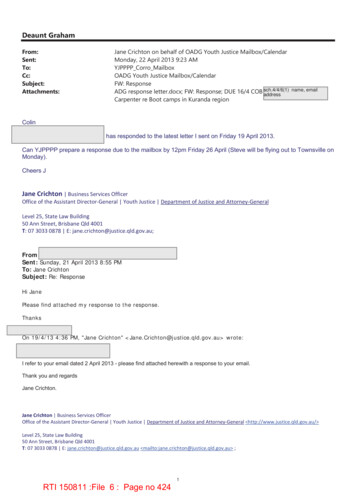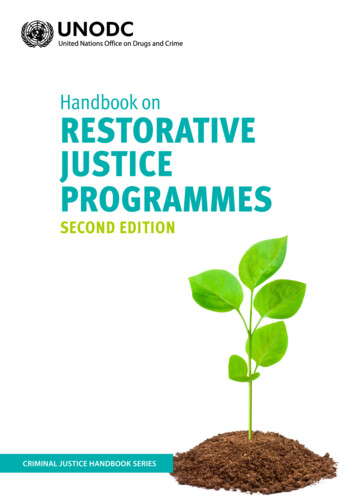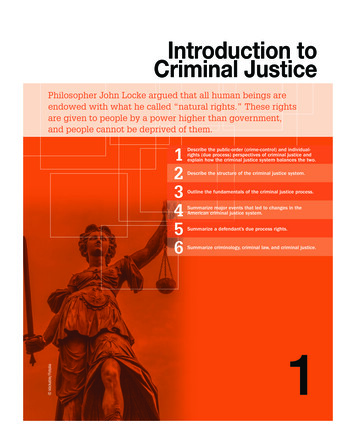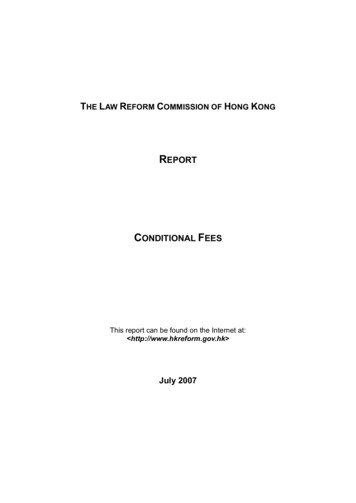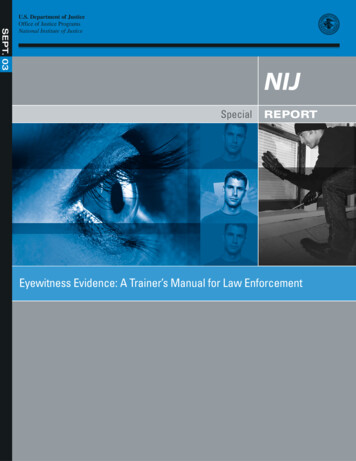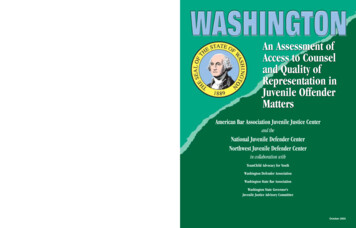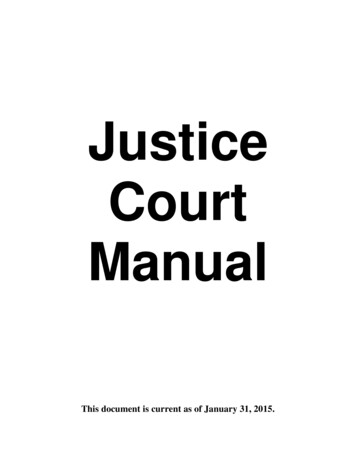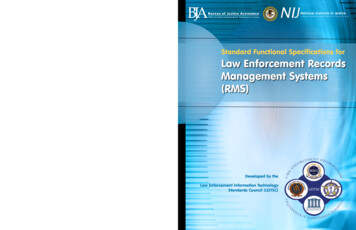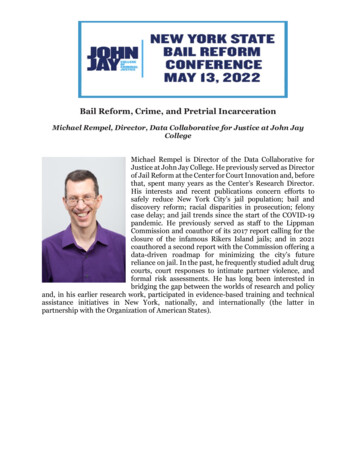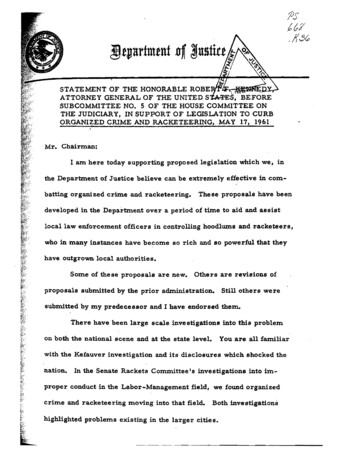
Transcription
Psf,r;y,;: !Jtparfmtnf :nK tt5tittSTATEMENT OF THE HONORABLE ROBEwr'J:i!.:-:li NE;xn:. ATTORNEY GENERAL OF THE UNITED S BEFORESUBCOMMITTEE NO. 5 OF THE HOUSE COMMITTEE ONTHE JUDICIARY, IN SUPPORT OF LEGISLATION TO CURaORGANIZED CRIME AND RACKETEERING. MAY 17, 1961Mr. Chairman:I am here today supporting proposed legislation which we, inthe Department of Justice believe can be extremely effective in com batting organized crime and racketeering.These proposals have beendeveloped in the Department over a period of time to aid and assistlocal law enforcement officers in controlling hoodlums and racketeers,who in many instances havebe omeso rich and so powerful that theyhave outgrown local authorities.Some of these proposals are new. Others are revisions ofproposals submitted by the prior administration. Still others weresubmitted by my predecessor and I have endorsed them.There have been large scale investigations into this problemon both the national scene and at the state level.You are all familiarwith the Kefauver investigation and its disclosures which shocked thenation.In the Senate Rackets Committee's investigations into im proper conduct in the Labor-Management field, we found organizedcrime and racketeering moving into that field.Both investigationshighlighted problems existing in the larger cities.
z Sometimes i we get the impression that the general publicbelieves that organized crime is a problem for the big cities, alone.!If anyone is under that misapprehension he can be corrected veryquickly by reading the report of the New York State Commission onInvestigation issued in February of this year.crime in Central New York State.It deals with organizedThen there is a report by theGeneral Investigating Committee to the House of Representatives ofthe 57th Legislature of Texas.The latter report details what I candescribe only as the rape of the city of Beaumont by organized crime.What the Texas committee found to be the results of organized crimehaving gained control of the town, will be of interest to you.The investigation found houses of prostitution, gambling clubs,punchboards, pinball machines, slot machines, numbers, and book making widely distributed throughout the city.Liquor was sold toteenagers and 45 pounds of raw opium worth 500,000 was sei.med. Ashas been pointed out so often, gambling, liquor violations, narcotics,bribery and corruption of local officials and labor racketeering andextortion go hand in hand.The Texas report details the effects of organized crime asfollows: The crime rate of the city rose 220/0 in 1960; desirable citi zens left town; the city is in the red by 1, 12.5,833; 350, 000 incurrent checks were issued with no covering funds in the bank; within
- 3 three years twQ water improvement projects ran out of money; thecity is deficient in neighborhood parks and supervised recreationfacilities; municipal bonds are difficult to sell; the city records werein suchb dshape that independent auditors refused to certify an ac counting rendered by the:m; and finally the efforts to attract industryto the city were sabotaged by the corrupting influence.This appalling story has not had its ending recorded yet. Anaroused citizenry currently is conducting a clean-up of what theyrightly consider to be a local problem. However, we in the Federalgovernment can be of great assistance to them and other honest citi zens.The opium seized in Beaumont was not grown locally in Texas,The pinball machines and other gambling devices were not manufac tured there.The profits from the activities did not remain in Texas.The information so necessary to the conduct of gambling operationsdid not originate locally, All the information and implements !lowedinto Beaumont through the medium of interstate commerce.Ourpackage of bills is designed to prohi'i?it the use of interstate facilitiesfor the conduct of the many unlawful enterprises which make up or ganized crime today,I now would like to discuss these bills in some general terms,I will turn first to H. R. 6572. which would prohibit travel
-4 in aid of racketeering enterprises.Organized Grime is nourished by a number of activities, butthe primary source of its growth is illicit gam.blingoFrom hugegambling profits flow the funds to bankroll the otJ:lel illegal activiIIties I have mentioned including the bribery of loul officials .The main target of our bill is interstate travel to promotegambling.It also is aimed at the huge profits itl the traf.:!lc inliquor, narcotics, prostitution, as well as the use of these fundsfor corrupting local officials and :for their use in racketeering inlabor and ma."lagament.Thus, when we speak of unlawful businessit is business engaged in the aforemer.a:'-ioned inJ.proper activities.A brief expla."l.ation of the method by which the funds areobtained by the bigtime gambling operator may be useful at thistime.Many persons think of the corner handbookoper toror theneighborhood m.erchant. who sells a nurnbers ticket to him., as theperson to whoru we refer when we talk of the gambling racketee.r.This is about as accurate as describing an iceberg as a'section ofice floating on top of the water.As with the iceberg the danger andthe size of the problem can only be fully appreciated if we go belowthe .surface.On the surface is the handbook operator.He makes a profit
- 5 from the persona who place bets with him. because he has an edge\on every bet. He pays track odds but usually not in excess of ZOto 1.The odds at 'the track are calculated after deducting the 15'0to 180/0 of the , total betting pool which goes to pay taxes and otherIexpenses.The bookmaker pockets that amount. However,,,,he isnot a man of unlimited resources.He must balance his books sothat he wiUlose no more on the winner than has been bet on theother horses in a race, after his percentage has been deducted.He cannot control the choices of his customers and very often hewill find that one horse is the favorite choice of his clientele. His."action", as he calls it, may not reflect the "action" of the track.Therefore, he must reinsure himself on the ra.ce in much the samefashion that casualty insurance companies reinsure a risk that istoo great for it to assume alone.To do this the bookmaker usesthe "lay off l1 man, who for a commission, accepts the excess wager.The locallay-offb,ettor also will have limited funds and hislay-off bets may be out of balance.When this occurs he calls thelarge lay-off bettors, who because of their funds, can spread thelarger risk.These persons are gamblers who comprise a nation wide syndicate or combine.They are in close touch with each otherall the time and they distribute the bets among themselves so that anoverall balance is reached on any horse race.
- 6 With a balanced book at the handbook, lay-off or syndicateIlevel the edge is Civided and no one loses except the man who placedthe original bet. As an indication of the volume of busine s s I am talk ing about, qne of the largest operators in the combine does a lay-offIbusinesso 18,000,000 a year.His net profit is 7Z0,000 a year.This is a 40/0 return on volume with relatively no risk as a result ofthe balancing of his books on each event.The term "gambleI'" is a misnomer for these persons.Theyaccept money that the small gamblers wager but they do not gambleat all.This is further illustrated graphically by what we know as thenumbers racket.A man purchases a ticket with three numbers on it, paying adollar for the ticket. Since there are 999 such numbers he shouldreasonably expect the odds be 999 to 1.The numbers bank usuallypays 600 to 1 on such a wager -- or less -- so you can see that theonly gambler in hissituation is the man making the bet.operator pockets 40 'cents on every dollar bet.is run honestly.group.TheThat is if the gameThat, however, is too much to expect from thisIf the play is too high on anyone number they manage throughdevious means to insure that a number on which the play has beensmall will be the winner.With that background on the type of business done by these
- 7 persons, letm now move to their interstate travel activities to showhow we hope to be of aid and assistance to local law authorities.The examples I am going to give have a factual basi s, but Iwillspea mainly in generalities in open session for obYioU8 reasons.Our first example is as follows: Some notorious individuals.whose names you would immediately recognize, had interests in anumbers bank but lived in a resort town far from the scene of opera tion.Every month a messenger carried the profits of the numbersracket from the scene of operations to the resort town.payments was in excess of 250,000.One of theThus, the persons reaping theprofit from the illegal activity remained beyond the reach of the laweDforcement officials at the place of operation and committed no crimein the state where they lived.Only the Federal government can curtailthe flow of funds which permit the kingpins to live far from the scene,preventing the local officials, burdened by the gambling activity, frompunishing him.If our bill is enacted we will be able to prosecute the courierwho carries the funds across state lines and in conjunction with theaiding and abetting statute (18 USC Z) we will be able to prosecutethe person who caused the courier to travel - the kingpin.This
- 8 example illustrates what we have found to be a pattern around thecount1'y where the apparently innocuous 10-cent numbers bet in a largecity turns into tremendous profits in the hands of big time hoodlums.Another example involves the frequent travel from a MidclleAtlantic state' to a New England state by the operator of a lottery and. or members of his family - to make payments to winners or pick upmoney wagered.Our information reveals that. in order to avoid thestatute proscribing interstate transportation of lottery tickets (18U.S" C. 1301), the individual carried the plates for printing the ticketsto the various states. He did that so the tickets could be printed locally.In another instance in a Mid-western state, the scene of illicitoperations is close to the border of the state. One individual travelsdaily between the two states. He conducts his layoff business in theone state and lives in a ZOO, 000 house in the suburbs of a large cityacross the border in the other state.Let me cite another example.The layoff men at the top ofthe bookmaking organization are in daily contact with each other toreinsure their bets and divide the action, thu8 assuring that all make aprofit and no one takes an exorbitantri k.
- 9 These people can conduct their businesses by telephone. Whenlocal authorities get close to them, they merely pick up stakes and moveto another jurisdiction. The best example of this moving to frustratelocal police, I ,is the case of a man who started operations as a layoff manin the midw 8tin 1946. He moved to another town in 1949 and then toNewport, Kentucky in 1950. In 1952, under pressure of the Kefauver in.vestigations into organized crime, he moved to Montreal, Canada.Whenthe Royal Canadian Mounted Police raided his establishment he movedback to Newport, Kentucky.We can follow these people from state to state and prosecute themfor the very activities which now make a mockery of local law enforce ment if this travel bill is enacted.The layoff men, who comprise the gambling syndicate, mustsettle their accounts periodically for they do not trust each other anymore than theytrus the average bettor.They settle the accounts byhaving a ''bagman'' travel throughout the country picking up and depositingfunds to balance the books. He receives reports of balances due fromeach of the layoff men. He acts as a clearing house and accountant forthe group - - settling the accounts in accordance with good accountingpractice - - in much the same manner that our banking clearing housesoperate. The only difference is that the banking houses are not afraid
- 10 of divulging their incomes through the use of banking channels.IThe gamblers use cash and a messenger to clear the daily balances.V{hen a Braniff airplane crashed at Buffalo, Texas t onSeptember 30. 1959, a collection man for a prime subject of theIIKefauver investigation, was killed.The collection man was en routeto New York with his boss's share of profits from gambling opera tions in Texas.With the enactment of this bill, prosecution maybe undertaken in future situations against men like this and the per sonswho send them to collect the proceeds.In summary, our information reveals numerous instances where the prime mover in a gambling or other illegal enterpriseoperate. by remote control from the safety of another state - - some times half a continent away. He sends henchmen to the scene ofoperations or travels himself from time to time to supervise theactivity and check on his underlings.As for the profits, he receiveshis share by me s senger.Another examRle of the type of situation which we are tryingto curb in proscribing the inter state travel in furtherance of an unlawfulactivity is the situation which arose in Hot Springs, Arkansas in 1960.A printing company in Jefferson Parish, Louisiana receives race wireinformation from Chicago bookmakers and disseminates the data togambling establishments in sections of the South and Southwest.The
. . 11 company is owned by a racketeer, since deported, and his race serviceImanager. of New O,rleans.The manager. while in Hot Springs inMarch of 1960 got into a violent argument with the owner of the racewire service there.The Hot Springs man told the New Orleans man toIIstay in New Orleans as he could operate his business without help.In May of 1960, the owner of the Hot Springs service traveledto Chicago and visited a Chicago rackets overlord.The Hot Springsman sought assistance in curtailing the activities of the New Orleansgroup in seeking to take over his race wire service.If we could .bowthe existence of race wire services in New Orleans and Hot Springsand the travel on thep rtof the New Orleans ::nan to expand the NewOrleans service and the travel of the Hot Springs man to protect hisinterest in the Hot Springs service we could prosecute both of thesetop racketeers with the enactment of the proposed bill.A race wire service has been provided in W.isconsin by Chicagohoodlums. In return for allowing the race wire service to pro sper inWisconsin, a person, who is now the subject of intensive investigations,has been allocated a portion of Antioch, Illinois for the conduct of gam bling. This individual apparently has trained his housemen at Kenoshabefore they traveled to Antioch to run the gambling operations. Suchtravel as by the Chicago people to Kenosha and the Kenosha hoodlums
. 12 to Antioch would violate the bill as travel to promote an unlawfulbusiness, thus permittingthe interruption if not the destruction ofIthe gambling empires.There is wide open gambling in Newport, Kentucky adjacent toCincinnati, Ohioand Covington, Kentucky.IA review of the financialstatements of four Newport gambling casinos in 1957 revealed that 11persons, who reside outside of Kentucky, participated in the casinoprofits.With this bill we would be able to move against interstate travelto distribute the profits of these casinos to the out-of-state owners.Edward Silver, the District Attorney of Kings County, testifiedbefore the New York State Commission of Investigation that there havebeen several unsolved gangland homicides connected with gambling inrecent years in his jurisdiction. It would be in keeping with past prac tices of this element if the perpetta:tors of the crimes had come from outof state.This practice was amply illustrated by the disclosures in thetrial of the members of the notorious "Murder Inc.JtNone of the activities of which I have just spoken, that is, inter state travel to carry oil a racketeering enterprise. travel to deliver theprofits of an illegal enterprise, or travel to commit a crime of violencein furtherance of the activities of an illegal business is now .!!' aviolation of state or federal law.The travel is performed by thesepersons with impunity. but because of that travel and the interstateaspects of the activities, the task of the local law enforcem ent officialsis staggering.
- 13 I am not discussing isolated instances but what we have foundto be a pattern of behavior in a number of geographic areas.We have skirted the area of social gambling by limiting theproposed statute to gambling, as a business, which violates state orFederal law. In this limited aspect, the enactment of the bill willbe a tremendous tool for stamping out the vicious and dangerouscriminal combinations.Mr. Chairman, this bill is vital. We need it.enforcement officials need it.LocallawThe country needs it.The second bill I wish to discuss H. R. 7039 amends Chapter\50 of title 18, United States Code, .with respect to the transmission ofbets, wagers, and related information. Its purpose is to assist thevarious States in enforcement of their laws pertaining to gambling andbookmaking. It would prohibit the use of wire communication facilitiesfor the transmission of certain gambling information in interstate andforeign commerce.Gambling in the United States, we estimate involves about70,000 persons and a gross volume of 7, 000, 000, 000, annually.The most diligent efforts of local law enforcement officers areoften frustrated by the ease with which information essential to gamblingoperations can be disseminated in interstate commerce.
. 14 .Bookmaking bases its operations upon races at about 20 majorrace tracks throdghout the country, and requires rapid transmission ofthe results on each race.Usually there are only a few tracks inioperation at any given time and the average bet placed with a bookmakerIis a small bne.In order to run a successful book that pays a good return, thebookmaker needs a volume of business.by the fact that bettors can playth irThis volume is usually obtainedmoney and any winnings upon thewhole card of daily races reported from. one or more tracks, if theyknow their standing from race to race.Thus, information almostsimultaneously transmitted prior to, during, and immediately aftereach race on such items as the starting hor ses, scratches of entri s,probable winners, betting odds, results and the prices paid. is essentialto both the bookmaker and his clientele in order to insure any sizablegambling.Furthermore, let me emphasize that no matter by what meansthe bookmaker and his clients receive this in-bound information - whether by telegraph ticker tape, by telephone, or even by radio ortelevision broadcast - - the bookmaker needs a means of rapid out-boundcommunication.This usually is by telephone - with other bookmakers.The purpose is to balance his book and protect against a severe 10s8when the betting becomes heavy on any particular entry.I have explained
- 15 this hedgingprocess known as layoff betting, in my earlier testimonyon the interstate travel bill.The rapid gathering and dissemination of trackside information·is a highly profitable and integral part of commercialized gambling onhorse racing.,' This information can beobtained. by stealth and use oftvarious ingenious devices, such as the "pitch-catcher" type operationwhere a man at the track flashes the result of a race by a hand signalor other device, to a confederate at an open telephone line.Theconfederate then gives the result to a central point of dis semination.The information is placed upon leased telegraph circuits or long distancetelephone line s running to the maj or cities of the country fr om which itis further fanned out on other leased circuits or telephone lines, or insome cases by radio broadcast, to the ultimate subscribers, the book makers, who pay a substantial fee for this vital service.The rapid results provided by this wire service are indispen sable to all bookmakers operating on any but the most modest scale.They are a means of expanding the play and stimulating further bettingfrom race to race.They protect the bookmaker from the dilemna ofeither refusing bets which are placed about the time a race is scheduledto start, or of accepting a bet on a horse which has already won therace.
. 16 .Equally essential to the boolanaker is the local telephoneservice which he r.q.ust have to avoid the risk of arrest for running anopen betting room.' He needs the telephone to take a substantial portionof bets; and, of course, the bettors also will use the phone to beinformed of phe results.Furthermore, telephones provide auxiliaryservice for rapid results where telegraph tickers or, speaker circuitsfail.In areas where ticker or speaker service is not available, thebookmaker must have at least one telephone for the exclusive purposeof receiving service from the subdistributor who supplies him withthe trackside information.In addition to the unique transmission situation in the fieldof commercialized horse-race betting, the gamblers also have movedinto large-scale betting operations in such amateur and professionalsports events as baseball, basketball, football, and boxing.This has been highlighted recently by disclosures that for thesecond time in 10 years, gamblers have bribed college basketballplayers to shave points on games. In this situation the bookmakerneeds telephone communication to get the latest "line" on the contest.This is the handicapped prediction of the probable results and thepoint spread in basketball and football.Without the latest information
- 17 .as to the condition of the team, and the happening of such thingsas late injuries to key players, the bookmaker is the victim offate.He cannot permit this to happen, so he subscribes to aservice which gives him and his confederates the latest up-to-the minute information which may bear on the result.It is quite evident that modern, organized, commercialgambling operations are so completely intertwined with the nation J scommunications systems that denial of their us e to the gamblingfraternity would be a mortal blow to their operations.This is the precise purpose of the proposed legislation. Itwould be an exercise by the Congress of its plenary power overL"l.teretate communications to aid the States in cO'ping with organizedgambling, by denying the use of inter state communication facilitiesfor such activities.It cannot be overemphasized that this bill is designed, firstto assist the States and Territories in the enforcement of theirlaws pertaining to gambling and like offenses. Second, the billwould in that regard help suppress organized gambling by prohibitingthe use of wire communications for the transmission of gamblinginformation in inter state and foreign commerce.it: .
. 18 The word "organized" is underscored because it should be cleartha.t the federal government is not undertaking the almost impossibletask of dealing with all the many forms of casual or social wageringwhich so often may be effected over communication facilities.It isnot intended th'at the act should prevent a social wager between friendsby telephone.This legislation can be a most effective weapon in dealing'with one of the major factors of organized crime in this country withoutinvading the privacy of the home or outraging the sensibilities of ourpeople in matters of personal inclinations and morals.The next bill I would discuss is one we sent to the Congree s, butwhich has not been introduced in the House.At this time, I would liketo ·speak in support of Subsections (a) and (b) of our draft.Subsection (c),dealing with false and misleading information will be presented as aseparate bill.The bill would amend chapter 73 of title 18, United StatesCode dealing with the obstruction of justice. Its purpose is to prohibitthe intimidation of witnesses in administrative investigations.The need for this legislation stems from the language of theexisting obstruction of justice statutes (18 U. S. C. 1503 and 1505) whichprohibit the intimidation of witnesses in matters pending before a courtor an administrative agency.Section 1503 prohibits the intimidation ofany witness in any court proceeding. Section 1505 prohibits the in timidation of any witness in any proceeding pending before any departmentor agency
- 19 Section 1503 has been construed in United States v. Scoratow;137 F. Supp. 620 a not applying to the intimidation of a witness in aninvestigation by the Federal Bureau of Investigation until a complaintIis pending in a Federal court.As so construed, the section leaves aIgap in the law which permits the intimidation of witnesses in preliminaryinvestigation.This withholds sanctions against persons who trlay bytheir actions forestall the commencement of criminal proceedings inthe Federal courts.The gap was recognized in the 85th Congress andremedial legislation was recommended by the Senate Subcommitteeon Improveme·nts in the Federal Criminal Code.You will, of course, understand that in very many cases investi gations are conducted in order to ascertain whether a complaint shouldbe filed or a matter referred to a grand jury. U this preliminaryinvestigation is frustrated by the intimidation of witnesses, the in vestigation may be brought to a halt before evidence sufficient towarrant the filing of a complaint or the referral of the evidence to agrand jury has been ascertained.Intimidation at this point thereforeis more effective than it would be at a later point when there may beother evidence upon which to proceed.Some examples of this intimidation are as follows.In theScoratow case, the defendant threatened to kill a Mr. and Mrs. Friedman
- zo if Friedman gave any information to the F. B. I. Friedman was beinginterrogated by the F, B. I. in an investigation of a possible false state ment to the FHA involving a nephew of Scoratow,The court held thatsuch intimidation was not within the purview of existing ob struction ofIjustice statute's and dismis sed an indictment against Scoratow,Another case such as this involved a man named Lloyd Scuttles.Scuttles had been interviewed in connection with a stolen automobile.When the man who sold Scuttles the automobile got out of prison, hethreatened to kill Scuttles because he believed that Scuttles had giventhe F. B. III information leading to his conviction. Scuttles was nevera witness at the trial of the man who threatened him.Therefore thecase was not within the purview of the obstruction of justice statute.In still another case, a man who had been interviewed byF. B. I. agents in a White Slave case was accosted by another manwho displayed a knife and threatened to kill our witness if he gave anyinformation to the F. B. I., or the police. Again, since the manthreatened was not a witness in a proceeding, no action could be takenagainst the threatener,These are some of the cases we know about.We don't know,of course, the nwnber of cases where the intimidation has been whollyeffective.
- 21 We are asking for an expansion of the obstruction statutes toIcover this situation.It is particularly necessary in view of the otherbills I am discussing today.If thpse bills are enacted the Department of Justicei goingIto be involved in large scale combat with the forces which use inter state commerce to conduct their criminal activities.who make up this element are tough and ruthless.The personsThey also areshrewd enough to be aware of the need of secrecy in the conduct oftheir activities.They know the dangers to which they will be sub jected if witnesses talk freely to our investigators. Therefore, weexpect attempts will be made to mislead us through intimidation ofwitne s ses by threats or by violence.I am sure that the gap of which I spoke previously is knownto the leaders of organized crime.They are made well aware of thelaws' limitations and the opportunities for forestalling investigations.This loophole permits the use of threats and violence in the fir ststages of an investigation thus preventing the development of a case.Our opponents are ruthless, vicious and resourceful.I can not stress this too much. They will use every weapon at their commandto prevent our discovery of incriminating information.The pre sentstate of the law is an open inv'itation to them to cripple our efforts
- zz. and prevent our inq\liries at the very point where witnesses needIprotection the most'.The need for this bill seems to me to bese 1 -evident.Then xtbills are H. R. 468 and H. R. 30Z3 to amend theFugitive Felon Act.They are identical.This amendment was intro duced in the 86th Congress at the behest of my predecessor as H. R.11897. It passed the House on August Z3, 1960 but no action wastaken on it in the Senate. It was again introduced at the beginning ofthis session of the Congress at Mr. Roger's recommendation.Iendorse this pr oposal and urge its enactment.The purpose of this proposal is to expand the coverage ofthe Fugitive Felon Act (18 USC 1073) which now makes it a federaloffense to flee a state jurisdiction in order to avoid prosecution orconfinement for certain crimes of violence.These crime s includemurder, kidnapping, burglary, robbery, mayhem, rape, assaultwith a dangerous weapon, arson punishable as a telony, extortionaccompanied by threats of violence or attempts to commit thoseoffenses.Although the law only applies to fugitives, who have committedthese crimes, this section has been extremely useful in strengtheninglocal law enforcement.It has enabled the F. B.I. to arrest fugitivesfleeing a state jurisdiction and turn them over to the state in which ?,'.;,.'L
- 23 they are arrested to await extradition by the demanding state.In1960, the F.B.I. apprehended 1,361 fugitives under the provisions ofthis law.Only two were tried in Federal Courts.The rest wereturned over to local authorities.We can understand the limited scope of the section if we goback to the time of its enactment in 1934.Local law e
fashion that casualty insurance companies reinsure a risk that is too great for it to assume alone. To do this the bookmaker uses the "lay off l1 man, who for a commission, accepts the excess wager. The locallay-offb,ettor also will have limited funds and his lay-off bets may be out of balance. When this occurs he calls the
